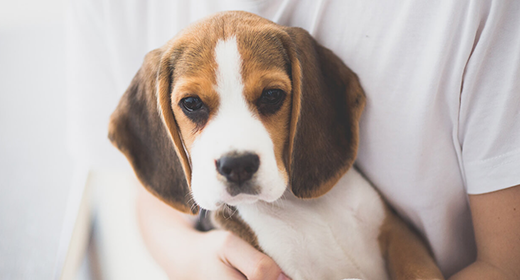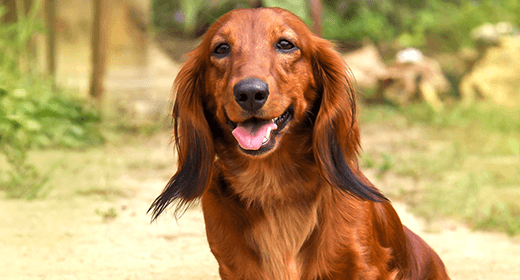

Your puppy will grow the fastest during the first six months of his life, so you’ll want to take special care to plan a healthy diet from the start. “Growing puppies have a lot more energy than adult dogs,” says Madan Khare, DVM. “They require more nutrients in each bite because they can’t eat in large quantities.” Here’s everything you need to know about feeding your puppy, including what food to choose, how often to feed him and how to handle treats and teething.
Look for a premium puppy food with key ingredients such as animal-based proteins (chicken, beef or lamb) for strong bones, and energy-rich fatty acids (omega-6 and omega-3 are two) for a healthy skin and coat. When perusing the products at your grocery store, don’t be tempted by the low-cost brands in the huge bags. They may contain lower-quality ingredients and artificial preservatives and may not provide your dog the with optimal nutrition he needs.
Premium puppy food, such as IAMS™ ProActive Health™ Smart Puppy, is more easily digested and has additional nutritional value, containing nutrients such as DHA that are naturally found in milk from the puppy’s mother. Discuss with your vet and read package labels to determine an appropriate formula for your dog’s breed and size.
Create a clean, quiet spot for your puppy to eat, preferably in the kitchen. Additionally, provide your pup with fresh water in a clean bowl at all times, even outdoors. You may want to place a mat beneath both bowls to easily clean up spills or crumbs and keep the area tidy.
Develop a consistent eating schedule that coordinates with yours. At first, feed your puppy three times a day (consult your vet about proper quantities). After four months, twice daily should be fine.
'Feed your puppy while you eat your breakfast, lunch and dinner,' Khare suggests. Your puppy will learn that you eat at the table and he eats from his bowl. This will deter any tendency to beg. “He'll appreciate the bonding time, too,” Khare adds.
Premium dry food, such as IAMS™ ProActive Health™, is your best bet for balanced nutrition, value and convenience. When stored properly, it’ll stay fresh longer than moist food — and it requires fewer cleanups.
For a teething puppy, you may want to mix dry food into moist food.
Use vet-recommended treats when training your dog, but with moderation. Don't offer human food, though — it may do more harm than good because it won’t have the important nutrients your pet needs.




Nutrients such as protein, fat, vitamins, and minerals are important players in the skin and coat health of dogs. To understand the role of these nutrients, it is necessary to start by understanding skin and hair.
The purpose of skin and hair is to block things from leaving (such as water or heat) or entering (such as viruses and bacteria) the body.
The hair coat is composed almost entirely of protein. If the animal's diet doesn't contain adequate protein quantity and quality, hair may fall out, or become dry, weak and brittle.
Skin is made up of squamous cells, flat cells tightly packed together. These cells have tough membranes that are composed of proteins and fats. Without proper amounts of these nutrients, cell membranes weaken, allowing water to escape and bacteria and viruses to enter more easily.
Proteins are found in both animal-based and plant-based ingredients. Animal-based proteins contain all the essential amino acids dogs need, whereas plant-based proteins may contain only some essential amino acids. Animal-based proteins help dogs achieve optimal health.
Fats can also be found in both animal-based and plant-based ingredients. They are incorporated into skin cells as fatty acids. There are two essential fatty acids for skin and coat health. Linoleic acid maintains skin and coat condition in dogs. Without enough linoleic acid dogs may experience dull, dry coat, hair loss, greasy skin and increased susceptibility to skin inflammation.
Both of these essential fatty acids are omega-6 fatty acids and are found in animal tissues like chicken fat. Linoleic acid is also found in some vegetable oils, such as corn and soybean oils.
Most commercial dog diets contain more than adequate amounts of omega-6 fatty acids. Because these fatty acids can be converted to compounds that increase susceptibility to skin inflammation, it is important to balance the amount of omega-6 fatty acids in the diet with omega-3 fatty acids, which reduce susceptibility to inflammation.
Omega-3 fatty acids are found in oils from fish and some plants (canola and flax).
IAMS research has found that combining fat sources in the diet at a ratio of 5-10 omega-6 fatty acids to 1 omega-3 fatty acid results in excellent skin and coat health.
Vitamins and minerals are essential for the development of healthy skin and hair coat. The best way to provide these nutrients is through a complete and balanced diet containing appropriate amounts of essential vitamins and minerals rather than through supplements.
| Vitamin or Mineral | Importance to Skin and Coat Health |
|---|---|
| Vitamin A | Necessary for growth and repair of skin |
| Vitamin E | Protects skin cells from oxidant damage |
| Biotin | Aids in the utilization of protein |
| Riboflavin (B2) | Necessary for fat and protein metabolism |
| Zinc | Necessary for fat and protein metabolism |
| Copper | Involved in tissue pigment and protein synthesis |
Diet is often believed to be a factor when changes in skin and coat condition are noticed. The most common causes of these changes, however, are season and life stage.
As cold weather approaches, most dogs grow a thick coat to help keep heat in and cold air out. As the weather begins to warm up, they shed the thick, heavy coat.
Most puppies are born with soft fuzzy hair, but as they age, a coarser coat grows. Pregnant or lactating dogs also may experience a change in coat condition or hair loss. And, as with humans, the hair on dogs may thin out and become coarser and white as they reach their senior years.